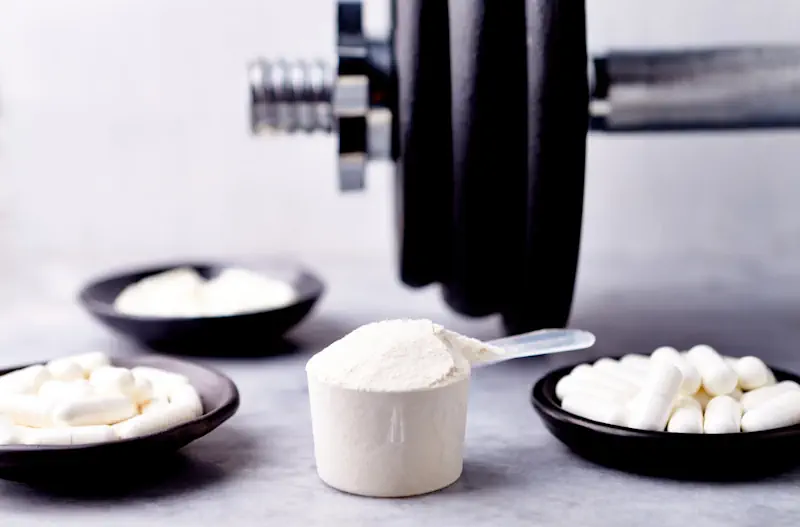Boost Strength: The Power of Beta-Alanine Supplementation

What's In This Article
- Introduction
- The Benefits of Beta-Alanine Supplementation for Strength Athletes
- Recommended Dosages and Timing for Beta-Alanine Supplementation
- Side Effects and Safety Considerations
- Conclusion
- References and Further Reading
What are the benefits of taking beta-alanine supplements?
Beta-alanine supplements increase muscle carnosine levels, buffering lactic acid buildup during exercise and delaying fatigue. This can enhance performance during high-intensity workouts, particularly for strength athletes engaged in short bursts of intense activity like weightlifting or sprinting.
Introduction
Welcome to a world of untapped potential. As you tirelessly strive for improved performance and muscle growth, it's essential to consider the role of supplementation in your training regimen. In this blog post, we shall delve into the world of beta-alanine, a supplement that may hold the key to unlocking your true potential. We will explore its benefits, dosages, and ideal timings to optimise your strength training journey.
To begin, let's familiarise ourselves with this non-essential amino acid. It has gained popularity in the strength training community due to its connection with carnosine production (Harris, Tallon, Dunnett, Boobis, Coakley, Kim, Fallowfield, Hill, Sale, & Wise, 2006). Beta-alanine combines with the amino acid histidine to form carnosine, which is then stored in your muscle tissue. When the going gets tough during high-intensity exercise, carnosine steps in as a knight in shining armour, helping to buffer hydrogen ions and increase muscle carnosine content through the production of carnosine to keep fatigue at bay.
Imagine your muscles are like a finely-tuned engine, and carnosine is the coolant that prevents overheating. By increasing your carnosine levels through beta-alanine supplementation, you're effectively upgrading your engine's cooling system. In other words, it may help you work harder, for longer, before succumbing to fatigue.
Now that we've covered beta-alanine basics let's delve deeper into its relationship with carnosine production. During high-intensity exercise, your muscles produce hydrogen ions as a byproduct, causing the pH to drop and creating an acidic environment. This acidity is a major contributor to muscle fatigue, impairing the muscles' ability to contract (Artioli, Gualano, Smith, Stout, & Lancha Jr, 2010). However, with the introduction of beta-alanine in the body, and in turn, higher levels of carnosine, this acts as an intracellular proton buffer against a drop in physiological pH and reduces acidity levels in the muscles during exercises. The reduction of fatigue tells us that this supplement is beneficial to professional athletes and those looking to gain a competitive edge.
As mentioned, Carnosine comes to the rescue by acting as a buffer, mopping up hydrogen ions and allowing you to push through the burn. In essence, carnosine is like a reliable cleaner that ensures your muscles stay in tip-top shape so you can continue to perform at your peak.
As we proceed, we will further explore the benefits of supplementation, discuss the appropriate dosages, and determine the best consumption times. Stay tuned, and together, let's unlock your true potential.

The Benefits of Beta-Alanine Supplementation for Strength Athletes
As you explore supplementation further, you may wonder what specific benefits it can offer you, the dedicated strength athlete.
Beta-alanine is a popular supplement known for its ability to enhance muscular endurance and sports performance, as well as benefit overall health. Research supports the idea that beta-alanine helps delay the onset of muscle fatigue by increasing carnosine levels in the muscles (Hobson, Saunders, Ball, Harris, & Sale, 2012). Supplementing can help increase the concentration of carnosine in muscles, which regulates acids that accumulate from exercise, helping an individual avoid fatigue and improve muscle strength. Imagine being able to push through high-intensity exercises like squats or deadlifts and squeeze out a few extra reps before feeling exhausted. This improved endurance translates to increased training volume and intensity, paving the way for greater strength and muscle mass gains.
Moreover, beta-alanine is particularly beneficial for activities that involve short bursts of high-intensity effort, such as sprinting or weightlifting. By buffering acidosis in the muscles during intense exercise, beta-alanine can help improve overall performance and reduce feelings of fatigue.
It's important to note that while it is effective for enhancing endurance and performance during high-intensity activities, individual responses may vary. It's always recommended to consult with a healthcare provider or nutritionist before incorporating any new supplements into your routine to ensure they align with your health goals and needs.
Secondly, beta-alanine can improve anaerobic performance. Studies have shown that supplementation can enhance power output, making you feel stronger and more explosive during workouts (Trexler, Smith-Ryan, Stout, Hoffman, Wilborn, Sale, Kreider, Jäger, & Earnest, 2015). Furthermore, it may aid in faster recovery between sets, enabling you to maintain high performance levels throughout your training session. This is especially beneficial for endurance performance, as shown in a systematic review by Quesnele et al. (2014), where participants who supplemented and engaged in high-intensity interval training improved their endurance performance. This makes supplementation a valuable tool for athletes engaged in resistance training, as it can improve their overall strength and performance. Imagine a sprinter who can recover quickly between sprints, maintaining their top speed and minimising the drop-off in performance.
In addition to its potential benefits for performance and endurance, beta-alanine supplementation has also shown promise in improving body composition. Although the scientific evidence in this area is still developing, some studies indicate that it may increase lean muscle mass and decrease body fat percentage (Kern & Robinson, 2011). Picture your body as a work of art; this supplement serves as a sculptor's tool to help carve away excess fat and unveil a more toned and defined physique. However, it is important to note that some studies have shown no significant differences in body composition and body weight after treatment . This dual-action approach to enhancing physical performance and body composition makes it a valuable supplement for individuals looking to optimize their overall fitness goals.

Recommended Dosages and Timing for Beta-Alanine Supplementation
Dosage
Beta-alanine is a popular supplement known for boosting muscle carnosine levels and enhancing athletic performance. Research indicates that a daily intake of 4 to 6 grams can effectively increase muscle carnosine levels, improving exercise capacity and endurance (Harris et al., 2006).
Individual factors such as body weight, exercise intensity, and personal tolerance must be considered when determining the optimal daily dosage. It is advisable to start at the lower end of the recommended dosage range and gradually increase it while monitoring your body's response. Some individuals may experience a tingling sensation known as paresthesia when taking this supplement, but this side effect is harmless and temporary.
It's important to consult with a healthcare provider or a nutritionist before incorporating beta-alanine supplementation into your routine, especially if you have any underlying health conditions or are taking medications. Combining beta-alanine with other supplements like creatine supplementation, sodium bicarbonate, and sports supplements may also synergise muscle performance and strength gains. Incorporating it into your pre-workout routine may help you push through intense training sessions and maximize your fitness goals.
Consistency is key when it comes to supplementation. To experience the full benefits, it's crucial to maintain a regular intake over an extended period, ideally at least four weeks or longer periods (Hobson et al., 2012). Think of it as a long-term investment in your performance and physique rather than a quick fix. Rome wasn't built in a day, and neither are your muscles. A 30-day study involving 18 elite soldiers found that supplementation improved cognitive function during combat testing sessions. Significant cognitive and physical function improvements were seen after just 5 and 10 weeks of supplementation.
Timing
Timing is a crucial factor to consider when it comes to supplementing with beta-alanine. Many individuals opt to take beta-alanine as a pre-workout supplement due to its potential to enhance exercise capacity and boost training volume (Stout et al., 2008). Since the primary effect of beta-alanine is the gradual elevation of carnosine levels in the body, the exact timing of supplementation may not be as significant as maintaining consistency in intake. However, studies have shown that longer supplementation periods, such as four weeks, may be more effective in improving athletic performance in time trial exercises. It is advisable to explore various timing options, such as taking it as a pre-workout or post-workout supplement, to identify the most effective approach based on your requirements and preferences for your daily dose. Additionally, it is important to note that the benefits of supplementation may vary based on individual factors, as seen in studies where the placebo group did not see the same improvements as the beta-alanine group.
In addition to pre-workout consumption, some individuals may choose to split their beta-alanine doses throughout the day to ensure a steady supply of muscle saturation. Others may find benefits from taking it post-workout to aid in muscle recovery and reduce exercise-induced fatigue. Experimenting with different supplementation timings can help determine what works best for maximizing the effects of beta-alanine on exercise performance and overall fitness goals. Remember that individual responses may vary, so listening to your body and adjusting your timing accordingly is key in optimizing the benefits of beta-alanine supplementation.

Side Effects and Safety Considerations
As with any supplement, it's prudent to consider potential side effects and safety concerns before incorporating beta-alanine into your regimen. After all, even a powerful elixir must be treated to ensure it brings about the desired benefits without causing harm.
Beta-alanine supplementation is renowned for enhancing athletic performance, particularly in activities requiring short, intense bursts of energy. Despite its benefits, one common side effect users may experience is paraesthesia, a tingling sensation typically occurring in the face, neck, and extremities. While paraesthesia is generally harmless and temporary, subsiding within an hour or two, it can be unsettling for some individuals. Consider breaking down your daily beta-alanine dosage into smaller, more frequent servings or opt for a time-release formula to alleviate this sensation. Think of paraesthesia as a friendly reminder that your supplement is working its magic – like a surprising visit from a ticklish friend. Proper management techniques allow this sensation to be easily controlled without compromising the efficacy of beta-alanine supplementation.
When considering the safety aspects and contraindications of beta-alanine, it is crucial to be aware of any possible interactions with other supplements or medications that you might be using. Although beta-alanine is typically safe for the majority of individuals, seeking advice from a healthcare provider before introducing any new supplement is advisable, especially if you have existing medical issues. Think of your body as a finely tuned machine and your healthcare professional as the skilled mechanic who can ensure that all components work together seamlessly.
In addition to consulting with a healthcare professional, it's important to understand that individual responses to supplements can vary. Factors such as dosage, frequency of use, and personal health conditions can all influence how your body reacts to beta-alanine. Keeping track of any changes in your health or well-being after starting a new supplement regimen is essential for monitoring its effects.
Moreover, being informed about the source and quality of the beta-alanine supplement you choose is key. Opting for reputable brands that undergo testing for purity and potency can help ensure that you are consuming a safe and effective product. By staying vigilant about your supplement intake and prioritizing your health and well-being, you can make informed decisions regarding the use of beta-alanine and other dietary supplements for their potential health benefits and to avoid any potential side effects or safety concerns.
In summary, while beta-alanine supplementation is generally safe and well-tolerated, it's essential to be mindful of potential side effects and any specific safety concerns that may apply to your circumstances. By doing so, you'll be well-equipped to make informed decisions about incorporating beta-alanine into your strength training journey.
Conclusion
As we reach the end of this exploration into beta-alanine supplementation, it's time to reflect on our insights and consider how they might impact your strength training journey. Armed with newfound knowledge, you're poised to unlock your true potential and push the boundaries of your athletic prowess.
Let's recap the benefits beta-alanine supplementation can offer you, the dedicated strength athlete. By enhancing muscular endurance, improving anaerobic performance, and potentially contributing to better body composition, beta-alanine can be a powerful ally in your quest for increased strength and improved physique.
Remember that the key to success with beta-alanine supplementation lies in finding your optimal dosage and timing. Don't be afraid to experiment and tailor your supplementation strategy to suit your unique needs. Like an intrepid explorer, chart your course and discover the path that leads to the greatest rewards.
Finally, consider the potential impact that beta-alanine supplementation could have on your performance and overall training goals. As you harness the power of this remarkable amino acid, you'll be well-equipped to conquer the challenges that lie ahead in your strength training journey. So go forth, embrace the benefits of beta-alanine, and make your mark in the annals of athletic history.
References and Further Reading
As you continue to expand your knowledge and understanding of beta-alanine supplementation, strength training, and sports nutrition, we encourage you to explore the following scientific articles and resources. These references will provide a solid foundation to build your expertise and fuel your pursuit of excellence.
Scientific Articles and Resources Related to Beta-Alanine Supplementation:
- Artioli, G. G., Gualano, B., Smith, A., Stout, J., & Lancha Jr, A. H. (2010). Role of beta-alanine supplementation on muscle carnosine and exercise performance. Medicine & Science in Sports & Exercise, 42(6), 1162-1173.
- Harris, R. C., Tallon, M. J., Dunnett, M., Boobis, L., Coakley, J., Kim, H. J., Fallowfield, J. L., Hill, C. A., Sale, C., & Wise, J. A. (2006). The absorption of orally supplied beta-alanine and its effect on muscle carnosine synthesis in human vastus lateralis. Amino Acids, 30(3), 279-289.
- Hobson, R. M., Saunders, B., Ball, G., Harris, R. C., & Sale, C. (2012). Effects of beta-alanine supplementation on exercise performance: a meta-analysis. Amino Acids, 43(1), 25-37.
- Kern, B. D., & Robinson, T. L. (2011). Effects of beta-alanine supplementation on performance and body composition in collegiate wrestlers and football players. The Journal of Strength & Conditioning Research, 25(7), 1804-1815.
- Stout, J. R., Cramer, J. T., Zoeller, R. F., Torok, D., Costa, P., Hoffman, J. R., ... & O'Kroy, J. (2008). Effects of beta-alanine supplementation on the onset of neuromuscular fatigue
- Trexler, E. T., Smith-Ryan, A. E., Stout, J. R., Hoffman, J. R., Wilborn, C. D., Sale, C., Kreider, R. B., Jäger, R., & Earnest, C. P. (2015). International society of sports nutrition position stand: Beta-Alanine. Journal of the International Society of Sports Nutrition, 12(1), 1-14.
Recommendations for Further Reading on Strength Training and Sports Nutrition:
- Clark, N., & Applegate, E. (2013). Nancy Clark's Sports Nutrition Guidebook. Human Kinetics.
- Helms, E. R., Aragon, A. A., & Fitschen, P. J. (2014). Evidence-based recommendations for natural bodybuilding contest preparation: nutrition and supplementation. Journal of the International Society of Sports Nutrition, 11(1), 1-20.
- Schoenfeld, B. J., & Contreras, B. (2019). The Science of Muscle Hypertrophy: Training Principles for Maximizing Muscle Growth. Human Kinetics.
- Thomas, D. T., Erdman, K. A., & Burke, L. M. (2016). American College of Sports Medicine joint position statement. Nutrition and athletic performance. Medicine & Science in Sports & Exercise, 48(3), 543-
- Artioli, G. G., Gualano, B., Smith, A., Stout, J., & Lancha Jr, A. H. (2010). Role of beta-alanine supplementation on muscle carnosine and exercise performance. Medicine & Science in Sports & Exercise, 42(6), 1162-1173.
- Harris, R. C., Tallon, M. J., Dunnett, M., Boobis, L., Coakley, J., Kim, H. J., Fallowfield, J. L., Hill, C. A., Sale, C., & Wise, J. A. (2006). The absorption of orally supplied beta-alanine and its effect on muscle carnosine synthesis in human vastus lateralis. Amino Acids, 30(3), 279-289.
- Hobson, R. M., Saunders, B., Ball, G., Harris, R. C., & Sale, C. (2012). Effects of beta-alanine supplementation on exercise performance: a meta-analysis. Amino Acids, 43(1), 25-37.
- Kern, B. D., & Robinson, T. L. (2011). Effects of beta-alanine supplementation on performance and body composition in collegiate wrestlers and football players. The Journal of Strength & Conditioning Research, 25(7), 1804-1815.
- Stout, J. R., Cramer, J. T., Zoeller, R. F., Torok, D., Costa, P., Hoffman, J. R., ... & O'Kroy, J. (2008). Effects of beta-alanine supplementation on the onset of neuromuscular fatigue and ventilatory threshold in women. Amino Acids, 32(3), 381-386.
- Trexler, E. T., Smith-Ryan, A. E., Stout, J. R., Hoffman, J. R., Wilborn, C. D., Sale, C., Kreider, R. B., Jäger, R., & Earnest, C. P. (2015). International society of sports nutrition position stand: Beta-Alanine. Journal of the International Society of Sports Nutrition, 12(1), 1-14.
- Clark, N., & Applegate, E. (2013). Nancy Clark's Sports Nutrition Guidebook. Human Kinetics.
- Helms, E. R., Aragon, A. A., & Fitschen, P. J. (2014). Evidence-based recommendations for natural bodybuilding contest preparation: nutrition and supplementation. Journal of the International Society of Sports Nutrition, 11(1), 1-20.
- Schoenfeld, B. J., & Contreras, B. (2019). The Science of Muscle Hypertrophy: Training Principles for Maximizing Muscle Growth. Human Kinetics.
- Thomas, D. T., Erdman, K. A., & Burke, L. M. (2016). American College of Sports Medicine joint position statement. Nutrition and athletic performance. Medicine & Science in Sports & Exercise, 48(3), 543-